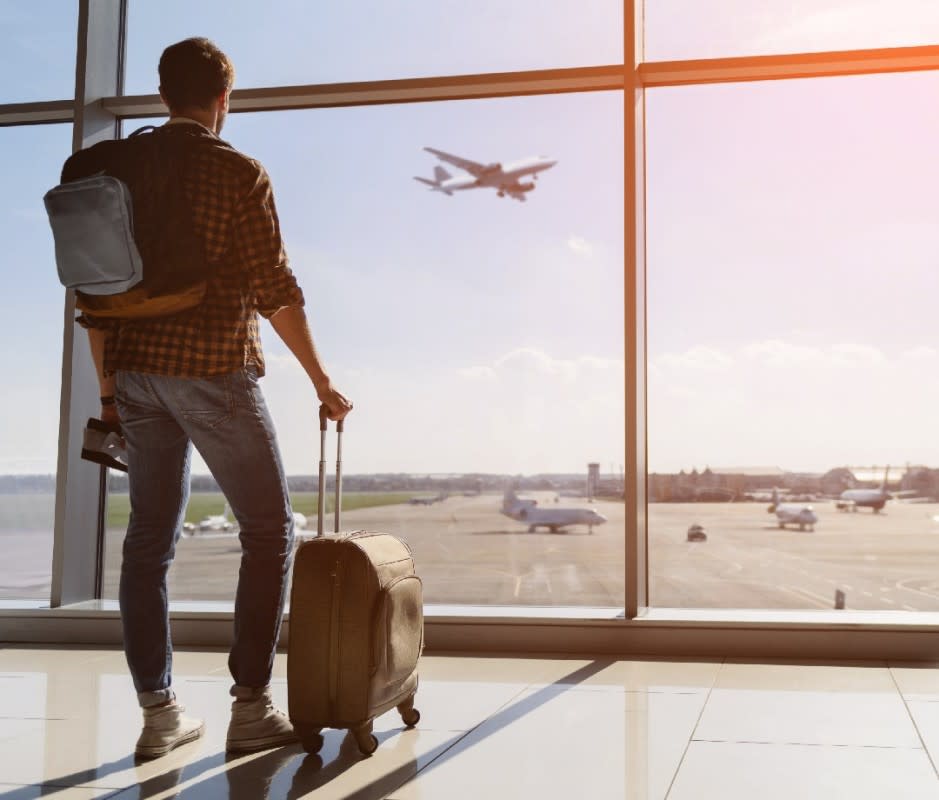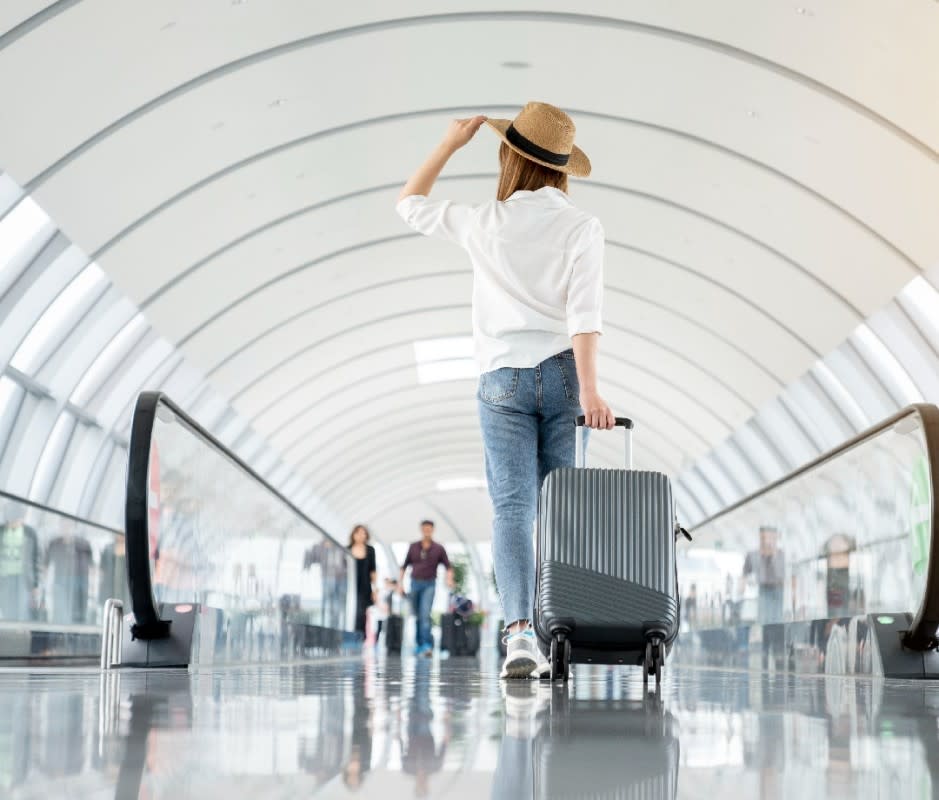What Is Skiplagging—and Is It Worth the Increasing Risks?
A few years ago, Timon van Basten, a travel blogger and tour guide in Spain, was searching for flights from Barcelona to Athens. The direct flight was oddly expensive, he recalls, so he plugged his route into a site called skiplagged and found out he could book a flight to Istanbul with a connection in Athens for roughly half the price. With just a carry-on bag in tow, he disembarked in Athens, never intending to board his connecting flight—or giving much thought to the fact that this was his first time engaging in a practice called skiplagging. It wouldn't be his last.
Savvy travelers looking to save money on flights have, for years, taken advantage of this somewhat counterintuitive yet cost-effective “hidden city” airfare loophole that Van Basten described. But while skiplagging may be nothing new, the practice is increasingly drawing ire from the airlines. If they catch on to your connecting flight-ditching, cost-saving tactics, they could cancel your flight and ban you from flying for a few years. These are the exact sanctions American Airlines imposed on a teenager, who, in July, planned to disembark at his layover in Charlotte, NC, instead of flying all the way through to New York City.
Related: The Best Small Towns in America for Every Type of Traveler
“It's like playing a risky hand in poker—the stakes are high, but so are the rewards,” says Van Basten, who claims to have saved several hundreds of dollars on airfare by successfully skiplagging here and there—while playing his hand carefully, or just getting lucky.
So, what exactly is skiplagging, why are airlines trying to stop you from doing it, and what should you know before you give this hidden city trick a whirl?

YakobchukOlena/Getty Images
What Is Skiplagging—and Is It Illegal?
Skiplagging is the practice of hopping off in your layover city instead of boarding the connecting flight to your ticket’s final destination. Many travelers do this in order to capitalize on a lower airfare to your secretly intended destination (the layover city). While skiplagging is not illegal, airlines prohibit the practice in their customer agreements.
“You can get in hot water if they catch on to what you’re doing,” says Katy Nastro, a travel expert with Going, formerly Scott’s Cheap Flights.
How hot? In addition to banning you from future flights, airlines could strip you of your loyalty status, miles, or, require you to pay the original price of the direct flight if they catch on that you’re skiplagging—which they're actively looking out for more than ever. To borrow that poker analogy again, think of card counting in casinos. There are no federal or state laws prohibiting it, but if these private companies suspect you're trying to game their system (and we all know they're quietly watching up there), buh-bye.
“Airlines abhor the practice of skiplagging because it undermines how they price their flights for routes,” says Nastro. “But again—not illegal. It's like buying a large sub and only eating half. You bought it, so you have the right not to eat all of it if you choose.”
Related: World's 20 Best Airlines List Only Has One U.S. Carrier
In August, American Airlines became the latest to file suit against Skiplagged, the search engine that snubs airline endorsements in favor of using its algorithm to reveal the cheaper hidden-city flights to its users. A judge threw out a case United Airlines brought against Skiplagged in 2015.
When customers buy a flight, but don’t fly all of the segments in their itinerary, it can lead to problems with checked bags and prevent other customers from booking a seat when they may have an urgent need to travel, according to a statement American Airlines provided to Men’s Journal. “Intentionally creating an empty seat that could have been used by another customer or team member is an all-around bad outcome,” the statement says.

Virojt Cahngyencham/Getty Images
The Case for Skiplagging
Skiplagged, a discount flight site, launched about a decade ago “when the founder noticed that longer layover flights can oftentimes cost less than shorter direct ones,” says Dan Gellert, the site’s chief operating officer. “Let’s say a flight from Seattle to Minneapolis is $500, but a flight from Seattle to Chicago is $300, and it has a layover in Minneapolis,” says Gellert. “Why not skip the last leg and save $200? These cost differentials pop up because airlines have monopolistic prices on certain routes,” he explains.
Related: New Study Finds the Best Way to Combat Jet Lag
Gellert points to the Charlotte Douglas International Airport where American Airlines and its regional carrier control about 90% of the flights that come in and go out. “As a result, fares in and out of that airport are not competitive,” he says.
“As the cost of travel increases and travelers are increasingly looking for ways to tighten their belts, Skiplagged helps them bypass the price gouging,” adds Gellert.
According to NerdWallet’s latest Travel Price Index, the overall cost of traveling has shot up 12 percent since 2019. Airfare is bucking the trend, and has actually gone down 5.6 percent between 2019 and 2023, according to the personal finance site. Fares, of course, can still vary wildly for any given destination—especially when factoring skiplagging into the equation.
How to Skiplag Without Getting Caught
Should you want to try, skiplagging requires some prudence and strategy.
Airlines have revenue management teams that are analyzing flight patterns, and they’ll probably catch on if you’re consistently not boarding your connecting flights, Gellert advises. That’s why those experienced in skiplagging will fly with different airlines, won’t attach their loyalty programs to their tickets, and won’t attempt to skiplag more than a couple times a year with the same airline.
If you’re using this hidden city hack, you definitely can’t check a bag, reminds Nastro, because it will route to your ticket’s final destination, not your final destination. Also, it should be a bag that can fit under your seat, because if you're in a late boarding group, there’s a good chance that the overhead baggage areas could fill up. Then you’ll have to gate-check your bag—which will head to your final destination.
Also, you’ve got to book your flights as one-way tickets, Nastro also emphasizes.
“If you attempt this on a roundtrip, your entire ticket immediately gets canceled once you are counted as a no-show for that second leg,” says Nastro. “Using a hidden city ticket is nuanced, and you can definitely find the cons outweigh the pros if not careful.”

